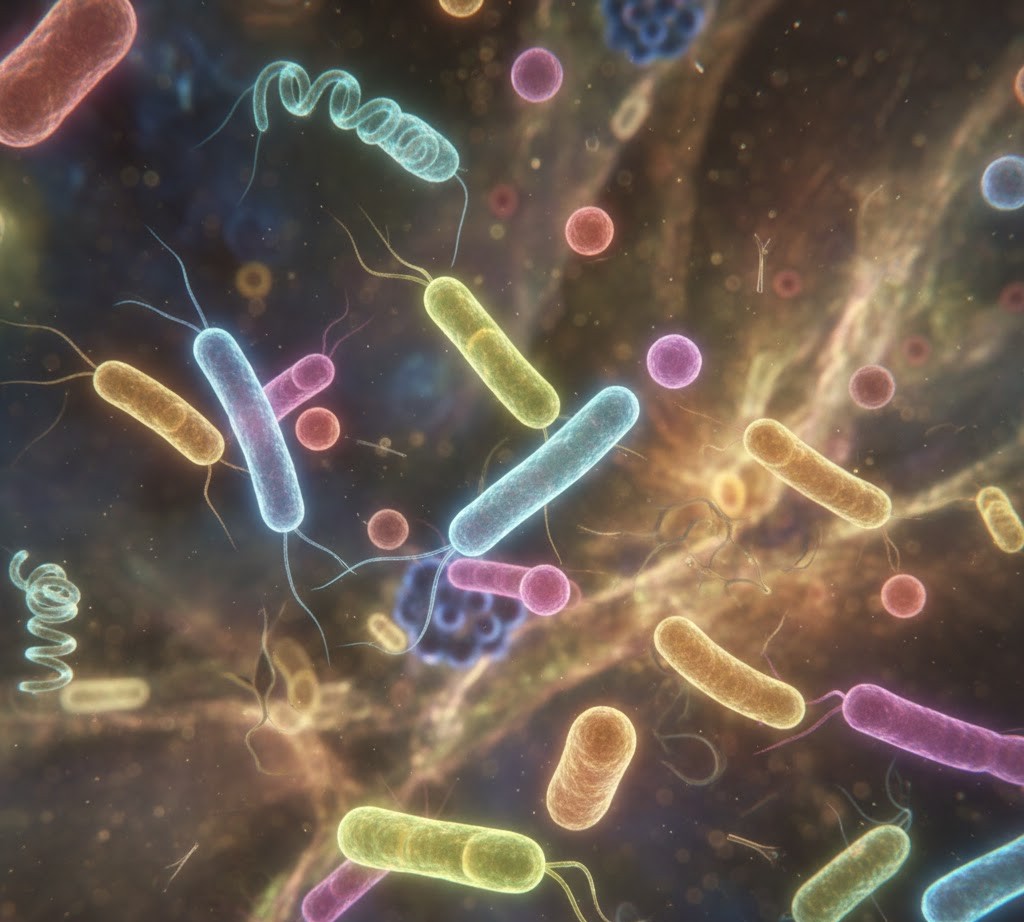
We like to think of ourselves as singular beings—every cell carrying our unique **DNA** that makes us who we are. However, modern science is dramatically redefining that idea: you are not alone. Your body is a walking, breathing ecosystem inhabited by **trillions of microorganisms** (bacteria, fungi, viruses, and archaea), each with its own genetic code. This symbiotic community, collectively known as the **microbiota**, is concentrated mainly in the gut and is now understood to exert profound control over our health, nutrition, and even our mood.
1. The Numerical Paradox: A World Governed by Foreign Genes
For decades, it was estimated that bacterial cells in our bodies outnumbered our own human cells by a factor of 10 to 1. More recent and accurate estimates suggest the ratio is closer to **1:1**—meaning an average person has roughly 30 trillion human cells and around 39 trillion bacterial cells.
However, the true paradox emerges when we look at the **genes**. The human genome contains approximately **23,000 genes**, whereas the combined genetic material of all our microorganisms—the **microbiome**—contains an estimated **2 to 20 million distinct genes!** This means that **over 99% of the genetic information** residing in your body is non-human. This vast library of foreign genes performs countless chemical reactions that our own DNA is incapable of, yet are absolutely critical for our survival.
The Microbe's Resume: Essential Services Rendered
These microbial partners, primarily located in the large intestine, manage vital processes that aren't encoded in human DNA:
- **Nutrient Digestion:** Human enzymes cannot break down fiber and complex carbohydrates. Gut bacteria do this job, producing beneficial **short-chain fatty acids (SCFAs)** like butyrate, which serves as the primary energy source for our colon cells.
- **Vitamin Synthesis:** A significant portion of vitamins, including **Vitamin K** and several **B vitamins** (like B12), are synthesized directly by the gut microbiota and absorbed by the body.
- **Immune System Training:** The presence of a diverse microbial community is essential for training the **immune system** to distinguish between harmless foreign substances and harmful pathogens, essentially acting as the body's first line of defense.
- **Pathogen Exclusion:** "Good" bacteria form a physical barrier on the intestinal lining, actively competing with and preventing the colonization of harmful, disease-causing microbes.
4. The Gut-Brain Axis: Your Second Brain
Perhaps the most revolutionary discovery is the profound influence of the microbiota on our neurological and psychological well-being. A bidirectional communication system known as the **Gut-Brain Axis** links the gut (home to the enteric nervous system) and the central nervous system (the brain).
The microorganisms produce precursors to key **neurotransmitters** that regulate mood. For example, up to 90% of the body’s supply of **serotonin**—the "feel-good" chemical—is produced in the gut, and the microbiota directly influences this production. This discovery has fueled research into how dietary and **probiotic** interventions might treat conditions like anxiety, depression, autism, and neurodegenerative disorders. The state of your gut, therefore, actively shapes your mind.
5. The Second Identity: Personalized Medicine
Each individual possesses a unique microbial signature—a microbial **fingerprint**. No two people have an identical microbiome, even identical twins. This community is constantly shaped and reshaped by factors like birth method (vaginal vs. C-section), diet, geography, antibiotic use, and interaction with the environment.
Understanding this "co-existence" opens new avenues for **personalized medicine** and dietary approaches. Instead of focusing solely on the 23,000 human genes, scientists are now concentrating on manipulating this vast microbial gene library to treat diseases, improve metabolic function, and optimize overall health. In essence, being human isn't about being **one organism;** it's about being a complex **superorganism** reliant on trillions of tiny, indispensable partners.
Were you surprised by this hidden ecosystem within your own body? Visit our Science category for more mind-blowing facts from biology, astronomy, and physics!